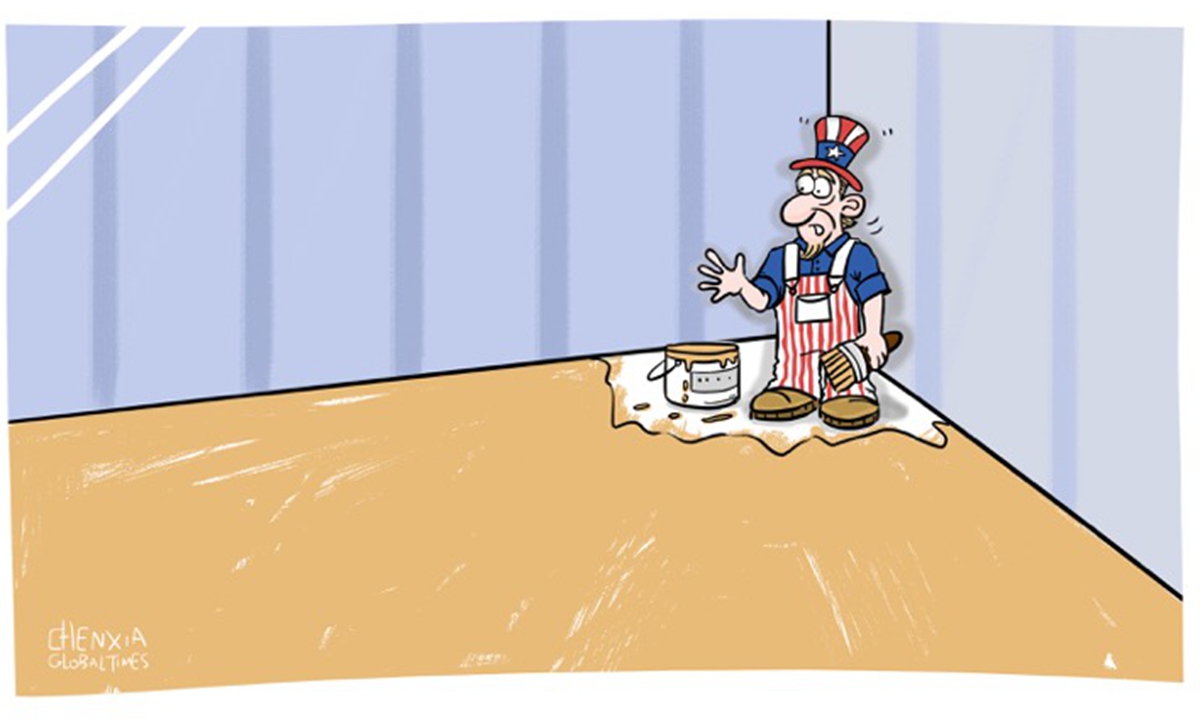China, US economies are complementary, no place for trade war
By Wen Sheng Source: Global Times Published: 2020/11/8 20:59:41

Illustration: Chen Xia/GT
The economies of China and the US remain largely complementary and mutually-facilitating. A continuation of the bitter bilateral trade and technology war which was launched by the Trump administration will harm both nations, extensively and deeply. It is time to retract and repeal that reckless and poisonous policy.Facts speak louder than words. As a resurgence in COVID-19 infections in the US and Europe has throttled day to day living and severely tempered market demand, China's enormous consumer market is coming to the rescue of many American companies.
In the July-September quarter, US companies including Apple, General Motors, Ford, Cummins, Estee Lauder and Coca-Cola, all reported a significant boost in sales to Chinese consumers, who have been spending big on electronic devices, cars, perfume, soda and many other products.
For example, in the three months ended September 30, Estee Lauder's global sales fell 9 percent year-on-year, but its China sales saw robust growth, according to media reports. Coca-Cola also reported it expects to see an expansion in its sales in the Chinese market, even as its global business continues to suffer due to the closure of bars, restaurants, movie theaters, gyms and stadiums elsewhere in the world.
Thanks to the Chinese government's effective measures to control the coronavirus, China's urban streets are now bustling with crowds of office workers and shoppers, and restaurants and malls are packed. Retail sales were up 3.3 percent in September from the previous year, all while the US market was struggling with staggering losses because of the virus.
However, the Trump administration's bitter trade and technology war in the past three years is dampening the enthusiasm of Chinese consumers. The two countries are also at odds over the COVID-19 pandemic, which Trump often calls the "China virus" in his intentional attempt to sling dirt on Chinese people.
The Trump government's vicious bid to strangle and stifle Huawei, ZTE, WeChat and TikTok, along with dozens of other promising Chinese technology startups added to its trade black list, has alienated swarms of Chinese consumers, many of whom vow to no longer buy US products, such as the popular Apple iPhone.
The complementary nature of the world's two largest economies is evident, explaining why the trade volume between them hovered at more than $500 billion annually before Trump's relentless trade war in late 2018. American consumers like inexpensive but good-quality products manufactured in China, and Chinese industries need to import large quantities of US products, semiconductor microchips and software made by US tech firms in particular, every year.
But Trump's preemptive tariff policy and his sanctioning of Chinese tech companies have spoiled the rising trade, injuring both economies. Currently, many US companies have to cope with lower profit margins, or are forced to slash workers' wages or cut jobs.
If the fraught political relations between the two nations are not repaired and the trade war is not stopped at the earliest possible time, the divide between the two nations will continue to chasm.
Not long ago, a study by the United Nations Conference on Trade and Development laid bare the impact of the two countries' distressful trade war. The study showed a sharp drop in bilateral trade since 2019. It also showed that households in the US bore the heaviest brunt of the Trump administration sanctions on China, as US' importing companies were charged more, which meant higher prices for the consumers.
Figures show that the Trump administration's tariffs have caused a 25 percent US export loss, inflicting a $35 billion blow on exports to China in the first half of 2019 due to China's retaliatory punitive tariffs. To make matters worse, the dispute between the two nations, which has seen multiple sanctions imposed on both sides, has not only affected their markets and companies, but also multinational companies worldwide.
Though the two countries signed a preliminary phase-1 trade deal in January 2020, some of the thorniest problems remain unsolved.
For instance, after the Trump administration imposed tough supply bans on Huawei on baseless national security grounds and encouraged other countries to follow suit, the Chinese company's ability to sell its telecoms gear and devices to other markets was seriously inhibited.
It's now high time to revisit and repudiate the damaging policies of the administration, and to bring the world back to its former course of genuine cooperation and partnership.
The author is an editor with the Global Times. bizopinion@globaltimes.com.cn
RELATED ARTICLES:
Posted in: COLUMNISTS